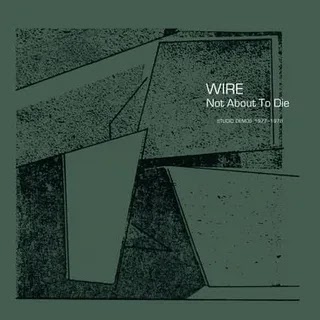Decades after it surfaced as a bootleg, a collection of demos from the late 1970s reveals hidden threads running through a crucial moment in the UK post-punk legends’ evolution.
Wire were never much for fan service. On the televised performance captured on the Wire on the Box: 1979 CD/DVD set, bassist Graham Lewis bats away an audience member’s demand for “I Am the Fly” by gravely informing him, “We don’t play requests,” like a boarding-school headmaster telling an orphan there’s no more porridge. That philosophy has served them well: The UK art-punk pioneers have thrived for the better part of 45 years by largely avoiding the things that 45-year-old bands do to stay in the newsfeed, like anniversary tours, trendspotting collaborations, or self-mythologizing biopics. Wire don’t give the people what they want so much as what they think they deserve.
But while Wire have always been paragons of anti-nostalgia, they also recognize that a lot of the stuff that gets left off their albums takes on a life of its own, acquiring a mythic status among fans that its creators never quite intended. And though they haven’t been shy about bringing castaway material to market via live albums or modernized re-recordings, Wire’s latest move constitutes their most extreme act of pride-swallowing to date: They’re giving an official release to an old bootleg they once wished never existed, but have come to recognize as a valuable snapshot of their evolution in its most dramatic phase.
On their 1977 debut, Pink Flag, Wire made a convincing case for being the world’s first hardcore band, setting new standards in brevity and velocity that the likes of Minor Threat would later use as their starting point. But within its opening seconds, 1978’s Chairs Missing reduced that legacy to an afterthought, introducing a more patient yet more peculiar strain of avant-pop that, with 1979’s 154, opened up into vast expanses of synth-frosted ambience and mutant prog. Cue up these three albums back to back to back, and you could be forgiven for wondering if you were still listening to the same group. But when it first surfaced on some fly-by-night imprint in the early ’80s, the unauthorized Not About to Die revealed a steady linear trajectory connecting albums that seemed to be separated by leaps and bounds. Comprising cassette demos passed around the EMI offices circa 1978-79, Not About to Die functions as a real-time document of a band caught between the idea of cranking out Pink Flag II and the reality that they were already getting bored of punk.
The songs collected here have dribbled out on various official releases over the years, whether through now out-of-print compilations or as reissue bonus tracks. This edition of Not About to Die brings them to vinyl for the first time, presenting a standalone “lost” album that provides a clear, chronological view of Wire’s metamorphosis in the late ’70s. And while the new remastering job can’t completely mask the album’s dubbed-cassette roots, the wobbly fidelity is ultimately overpowered by the kinetic thrill of the most innovative band of punk’s first wave. Of Not About to Die’s 18 songs, only half wound up seeing official release at the time, and the rest damn well deserved to.
The album’s first side reminds us that, for all their turbo-charged aggression and militaristic shouting, Wire also had hooks and humor to spare. Had they opted to take a safer route for their second album, discarded delights like “Oh No Not So (Save the Bullet)” and the ba-ba-ba-bouncy “Love Ain’t Polite” could’ve positioned Wire as serious challengers to the Buzzcocks. The band teased at this direction with the release of their 1978 stopgap single “Dot Dash” / “Options R”; the latter track is featured here in more or less finished form. But an early take on “French Film Blurred” provides a stark indicator of just how swiftly and severely Wire would change course. The version that appears on Not About to Die is a scrappy rave-up that would’ve been right at home on Pink Flag, but when the song surfaced on Chairs Missing just a few months later, all that remained were the lyrics, which singer/guitarist Colin Newman applied to an entirely different arrangement that tiptoed the line between eerily calm psychedelia and time-bomb tension.
While no other song on this set underwent quite as radical a transformation on the journey from demo to post-punk classic, the 154-era material included here is equally fascinating. By that record, Wire’s punk roots had been all but vanquished by their growing affinity for proto-industrial propulsion, gothic grandeur, and futurist sound design, so it’s a real treat to hear steely, synth-streaked standards like “I Should Have Known Better” (née “Ignorance No Plea”) and “On Returning” in more primitive, violent form, while charting the development of “The Other Window” from Newman’s pogo-ready romp to a queasy spoken-word set piece recited by guitarist Bruce Gilbert. Alas, the sheer rapidity of Wire’s progression meant they could no longer accommodate simpler pleasures like “Stepping Off Too Quick (Not About to Die),” whose slow, sustained intro tees up an exuberant jangle-punk surge that anticipates the Feelies’ epochal Crazy Rhythms. Newman has claimed this song contains “the best intro to any song ever,” but even that was apparently not enough to meet Wire’s exacting standards at the time. So if you’ve ever been to a Wire show and had your hollered requests for “12XU” or “Outdoor Miner” met with derisive stares from the stage, take heart: Sometimes, this band ignores even its own members’ favorites.



%20Music%20Album%20Reviews.webp)












0 comments:
Post a Comment